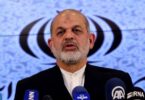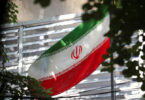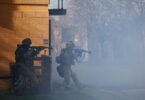Monitoring Desk
WASHINGTON: President Trump persistently tried to curtail or shut down the special counsel’s investigation, according to Robert Mueller’s report, which also gave a detailed account of Russia’s election interference and its efforts to communicate with the Trump campaign.
The 448-page report, released Thursday, follows a nearly two-year investigation into Russia’s interference in the 2016 election and ties to Trump’s campaign. Besides laying out its findings of actions by Trump and his associates, the document presented Mueller’s legal reasons for not reaching a conclusion on whether Trump committed a crime, and the basis for not establishing that campaign contacts were part of a criminal conspiracy.
Mueller, explaining in the report why he didn’t pursue an obstruction charge, cited in part Justice Department guidance that a sitting president can’t be indicted.
“Fairness concerns counseled against potentially reaching” a judgment that Trump committed crimes “when no charges can be brought,” Mueller wrote in the report.
The special counsel has previously charged dozens of Russian entities and individuals in a two-pronged attack of disinformation and hacked computers in 2016, and found repeated contacts between Russia-linked entities and Trump campaign officials that coincided with those efforts before the election. But Mueller didn’t establish that anyone affiliated with the GOP presidential campaign knowingly conspired with those efforts, the report said.
Even so, the report lays out in detail what it says were attempts by Trump to control the Russia investigation and blunt its fallout. From the outset, according to the report, Trump voiced alarm in spring 2017 when he was told by aides that Mueller had been appointed as special counsel. “Oh my God. This is terrible,” the president said, according to notes by a top aide of then-Attorney General Jeff Sessions. “This is the end of my presidency. I’m f—d.”
Mueller’s team concluded that while Trump’s actions could have exerted influence on their investigation, his efforts were “mostly unsuccessful” because his subordinates declined to carry out orders. His White House counsel, for example, refused to convey to the deputy attorney general that Mueller “must be removed,” and later refused to dispute an accurate media report about it. His campaign manager agreed to convey a message to his attorney general to publicly announce Trump was being “treated very unfairly,” but passed it off to another official who did nothing with it.
“We recognized that a federal criminal accusation against a sitting President would place burdens on the President’s capacity to govern and potentially preempt constitutional processes for addressing presidential misconduct,” Mueller wrote.
At the same time, the report said that investigators didn’t believe the evidence exonerated Trump. “If we had confidence after a thorough investigation of the facts that the President clearly did not commit obstruction of justice, we would so state,” the report said.
The release Thursday marked the latest milestone in an investigation that has consumed the Trump presidency and ensnared several of Trump’s top campaign aides. While Trump has long called the probe a “witch hunt” and heralded the report’s findings on Thursday, congressional and other investigations continue into Trump’s associates and entities linked to the president.
Redacted portions of the report also indicate that a dozen other matters referred by Mueller’s team to other prosecutors remain ongoing.
“This should never happen to another president again, this hoax,” Trump said Thursday in the White House. In a statement, lawyers for Trump called the report “nothing more than an attempt to rehash old allegations.”
A month ago, Trump had said Attorney General William Barr’s top-line findings on the report had exonerated him.
House Democratic leaders, who have sought to play down talk of initiating impeachment proceedings against Trump, focused on their next move: asking Mueller to testify next month before the House Judiciary Committee and the House Intelligence Committee. Barr said he had “no objection” to Mueller’s testifying before Congress.
Mueller’s report offers the most comprehensive accounting yet of Moscow’s expansive operation to interfere in the 2016 presidential election, which included hacking and releasing embarrassing Democratic emails and weaponizing social media to inflame political and social divisions and boost Trump’s presidential bid.
“The Russian government interfered in the 2016 presidential election in sweeping and systematic fashion,” the introduction of the report states. Russia has denied the allegation.
While the broad outlines of the interference operation have long been known, Mueller dedicates the first 200 pages of his report to narrating the Kremlin’s well-funded, yearslong effort to target U.S. voters with an arsenal of digital weapons and make contacts with the Trump campaign. It recounts how the troll farm known as the internet Research Agency, for example, successfully organized dozens of political rallies in the U.S. that sometimes drew hundreds of attendees, and how it managed to use or recruit numerous U.S. citizens who apparently had no idea they were interacting with a Russian influence campaign.
The report explains that the hacking operations and social-media operations coincided with a series of contacts between Trump campaign officials, including Donald Trump Jr., and the Kremlin, though it didn’t establish a conspiracy existed between the two sides to work together to interfere in the election.
Mueller then devoted 182 pages to the obstruction issue, and he divided Mr. Trump’s actions into two phases, which Mueller said reflected a “possible shift in the President’s motives.” Mueller described the first phase as the May 2017 firing of James Comey as FBI director, before which Trump himself wasn’t under investigation.
After that, Trump “became aware that his own conduct was being investigated,” and engaged in a “second phase” of conduct which involved “public attacks on the investigation, nonpublic efforts to control it, and efforts in both public and private to encourage witnesses not to cooperate” in the investigation,” Mueller wrote. Mueller was appointed in May 2017 after Comey’s firing and continued an investigation that the FBI had started.
Mueller’s team examined a series of episodes, ranging from those publicly well known, including Comey’s firing, to others, including efforts to have Sessions publicly announce that the investigation was the result of Trump’s role in running “the greatest campaign in American history,” and asking his then-White House counsel Don McGahn to provide instructions to Deputy Attorney General Rod Rosenstein that McGahn described as “very crazy s—.”
Mueller said his office rejected the legal defenses that Trump’s legal team raised, including constitutional ones based on Trump’s inherent authority to use the powers granted to a president.
The special counsel’s report also reveals new details about Trump’s conversations with his former lawyer Michael Cohen during the 2016 campaign about efforts to build a Trump Tower in Moscow, which Cohen told prosecutors were far more extensive than the president has publicly indicated. “Cohen said that he discussed the talking points with Trump but that he did not explicitly tell Trump he thought they were untrue because Trump already knew they were untrue,” the report said.
In the report, Mueller and his team rejected a legal theory advanced by Barr in a legal memo he wrote while still in the private sector. In that June 2018 memo, Barr argued that a president’s exercise of his lawful authority can never amount to obstruction of justice.
“The constitution itself places no limit on the president’s authority to act on matters which concern him or his own conduct,” Barr argued in his memo.
The special counsel’s team rejected that expansive view of presidential power in its own legal analysis.
“We were not persuaded by the arguments that the president has blanket constitutional immunity to engage in acts that would corruptly obstruct justice through the exercise of otherwise-valid Article II powers,” the special counsel wrote, referring to the section of the Constitution laying out the president’s powers.
Mueller and his team of FBI agents and prosecutors have secured convictions of five Trump advisers, several of whom admitted to lying to investigators about their contacts with Russian officials. Among those convicted are Trump’s campaign chairman Paul Manafort,a foreign-policy adviser to his campaign, George Papadopoulos, and Mike Flynn, his first national security adviser.
Since Democrats took control of the House in January, committees have launched a number of their own investigations — into Trump’s finances, businesses, relationships with foreign states, White House security clearances, and other avenues.
The House Intelligence Committee has also reopened its own investigation of Russian election interference — and said it would probe whether any foreign government has leverage over Trump.
Federal prosecutors in the Southern District of New York are investigating the finances of Trump’s inaugural committee. A subpoena issued by that office in early February asked the committee for documents related to any donations “made by or on behalf of foreign nationals” as well as communications regarding the possibility of such donations. It’s illegal for foreign nationals to contribute to U.S. elections, including inaugural committees.
Longtime Trump associate Roger Stone is set to go to trial Nov. 5 on charges that he lied under oath and tried to obstruct a congressional investigation into Russian interference in the 2016 election.
The case was brought by Mueller’s team but has been handed off to the U.S. Attorney’s office in Washington.
Courtesy: (gazette.com)






